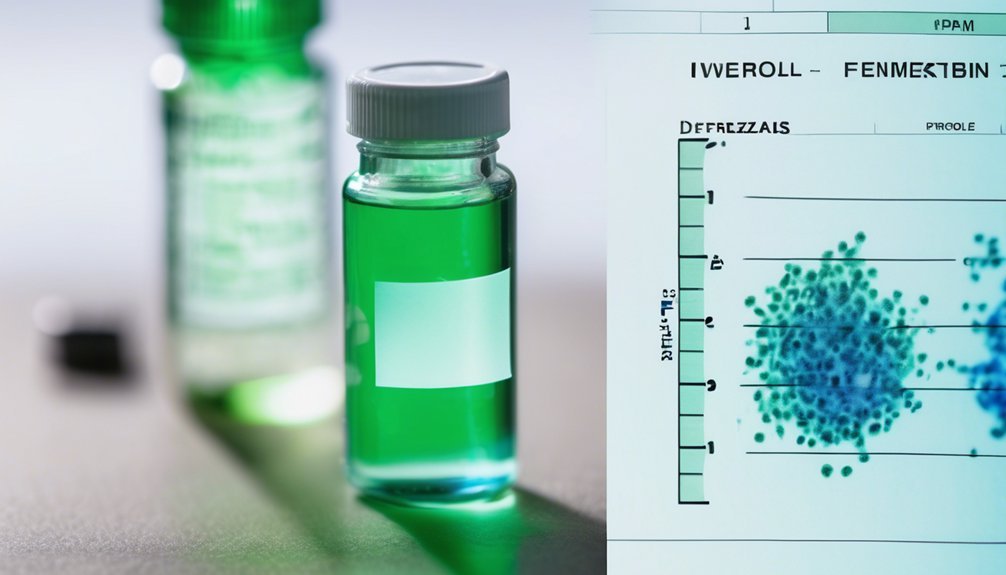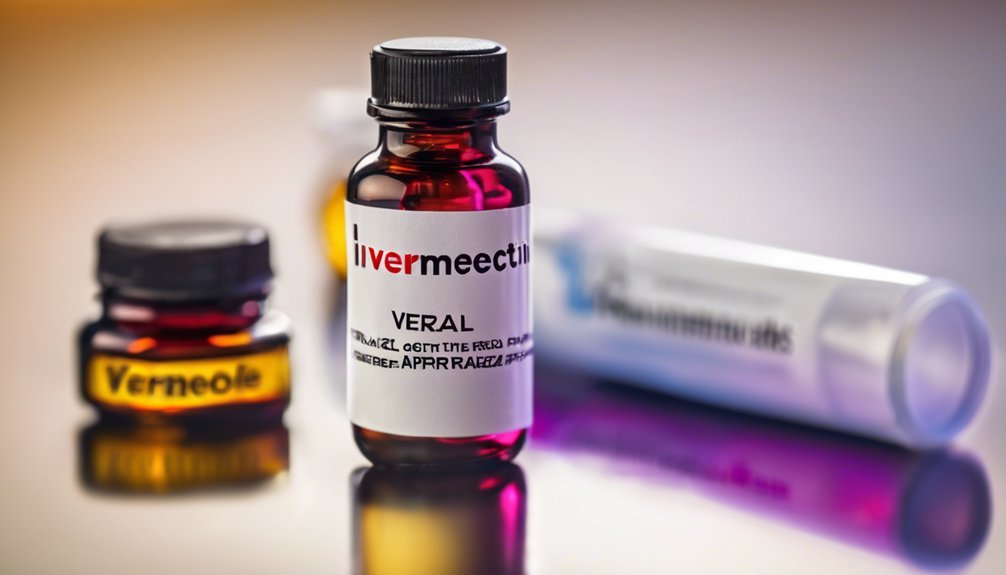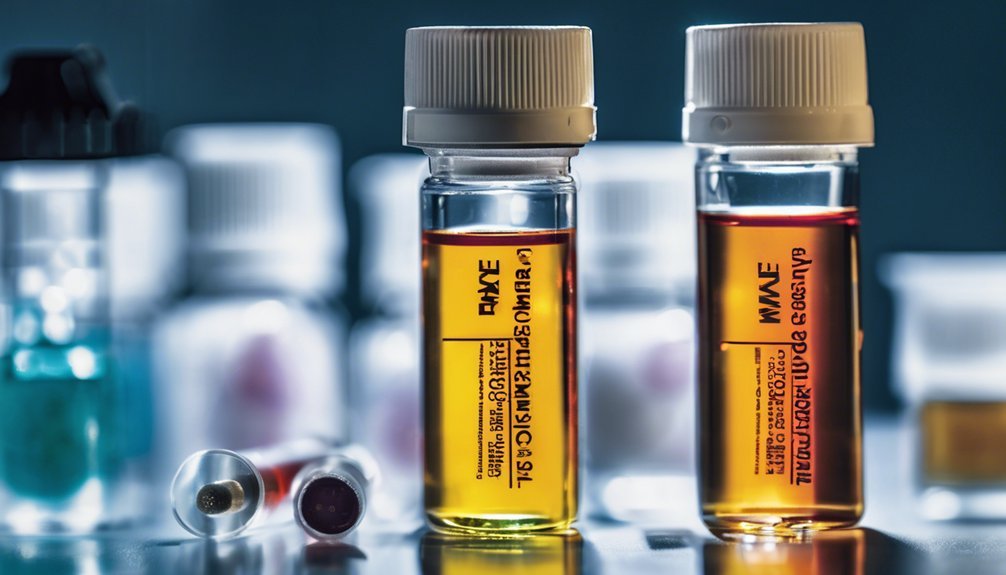When considering antiparasitic agents, you might find yourself weighing the differences between ivermectin and fenbendazole. Each drug has distinct mechanisms of action and varying levels of clinical support. Ivermectin’s well-documented efficacy contrasts sharply with the more anecdotal evidence surrounding fenbendazole. Understanding these differences, along with their safety profiles, is crucial for making informed decisions. What implications do these factors have for treatment strategies in clinical practice?
Key Takeaways
- Ivermectin acts by binding to glutamate-gated chloride channels, causing paralysis in parasites, while fenbendazole disrupts microtubule formation, inhibiting cell processes.
- Ivermectin has strong clinical support for treating various parasitic infections, whereas fenbendazole’s efficacy is primarily based on anecdotal evidence with limited clinical studies.
- Ivermectin is widely used in both human and veterinary medicine, while fenbendazole is primarily utilized in veterinary settings for gastrointestinal parasites.
- Dosage guidelines for Ivermectin are standardized based on infection type and patient weight, while fenbendazole’s recommendations vary significantly by animal species and size.
- Safety profiles differ, with Ivermectin generally well-tolerated in humans and animals, while fenbendazole’s long-term effects in humans are less understood due to limited research.
Overview of Ivermectin

Ivermectin, a powerful antiparasitic agent, has garnered significant attention for its effectiveness against a broad spectrum of parasites in both humans and animals.
Its history dates back to the late 1970s when Japanese researchers discovered it from a soil bacterium. Initially approved for veterinary use, its applications expanded to human medicine, effectively treating conditions like onchocerciasis and lymphatic filariasis.
You’ll find that ivermectin‘s uses extend beyond parasitic infections, as it’s being studied for potential antiviral and anti-inflammatory effects.
Its mechanism involves binding to glutamate-gated chloride channels, leading to paralysis and death of the parasites. This understanding highlights the importance of responsible use, ensuring it serves those in need while minimizing potential resistance and side effects.
Overview of Fenbendazole
Fenbendazole, another antiparasitic agent, is primarily used in veterinary medicine to treat a variety of gastrointestinal parasites in animals, particularly in livestock and pets. Its efficacy against nematodes and some protozoa makes it a valuable tool in managing parasitic infections.
When considering dosage guidelines, it’s essential to tailor the amount based on the specific type of parasite and the animal’s weight. Below is a summary of its therapeutic uses:
| Therapeutic Use | Dosage Guidelines |
|---|---|
| Canine parasites | 25 mg/kg daily for 3 days |
| Feline parasites | 50 mg/kg once daily for 3 days |
| Equine parasites | 1.0 g per 500 kg body weight |
| Bovine parasites | 5 mg/kg once daily for 3 days |
Understanding these aspects helps ensure effective treatment and optimal health for your animals.
Mechanisms of Action
When examining the mechanisms of action for these antiparasitic agents, it becomes clear that both ivermectin and fenbendazole operate through distinct pathways to combat parasitic infections.
Ivermectin primarily binds to glutamate-gated chloride channels, leading to paralysis and death of the parasites. This action is effective against various nematodes and ectoparasites.
On the other hand, fenbendazole disrupts microtubule formation within the parasite’s cells, inhibiting essential cellular processes.
Both agents exhibit different antiparasitic mechanisms, which can influence potential drug interactions. Understanding these pathways is crucial for optimizing treatment regimens, ensuring safety, and enhancing efficacy when serving populations affected by parasitic diseases.
This knowledge empowers healthcare providers to make informed decisions in their therapeutic approaches.
Clinical Applications

While both ivermectin and fenbendazole are effective antiparasitic agents, their clinical applications vary significantly based on the specific parasites they target and the conditions they treat.
Ivermectin’s utility spans a range of infections, including those caused by nematodes and ectoparasites, while fenbendazole is primarily used for gastrointestinal parasites in animals and has emerging interest in human applications.
- Ivermectin is often prescribed for onchocerciasis and lymphatic filariasis.
- Fenbendazole is utilized in veterinary medicine for its broad-spectrum antiparasitic properties.
- Treatment protocols for each agent differ, necessitating careful assessment.
- Dosage recommendations depend on factors like the type of infection and patient weight, highlighting the importance of tailored treatment approaches.
Evidence of Efficacy
Both ivermectin and fenbendazole have demonstrated significant efficacy against their targeted parasites, but the strength of their evidence varies. Ivermectin is supported by multiple clinical trials, showcasing its effectiveness against a range of parasitic infections. Conversely, fenbendazole’s evidence primarily stems from anecdotal evidence, with fewer robust clinical studies backing its claims.
| Drug | Source of Evidence |
|---|---|
| Ivermectin | Clinical Trials |
| Fenbendazole | Anecdotal Evidence |
While both drugs show promise, the reliance on anecdotal evidence for fenbendazole makes it essential to approach its efficacy with caution. You should consider the quality and quantity of clinical data available when determining the best treatment options for those in need.
Safety and Side Effects
Understanding the safety profiles and potential side effects of ivermectin and fenbendazole is crucial for informed decision-making regarding their use.
Both medications have distinct adverse reactions and require careful dosage considerations to minimize risks.
- Ivermectin may cause dizziness, nausea, or skin rash in some individuals.
- Fenbendazole is generally well-tolerated but can occasionally lead to gastrointestinal upset or lethargy.
- Monitoring is essential, especially in patients with liver or kidney impairments.
- Always consult a healthcare professional for personalized dosage advice to avoid complications.
Comparative Effectiveness

When evaluating the comparative effectiveness of ivermectin and fenbendazole, it’s essential to consider their specific mechanisms of action and the types of infections they target. Ivermectin is primarily effective against ectoparasites and certain nematodes, while fenbendazole targets a broader range of intestinal parasites.
Here’s a quick dosage comparison and treatment outcomes overview:
| Drug | Typical Dosage |
|---|---|
| Ivermectin | 150-200 mcg/kg once |
| Fenbendazole | 5-10 mg/kg for 3 consecutive days |
Both drugs have shown positive treatment outcomes in clinical settings, but the choice largely depends on the specific infection. Understanding these differences can refine your treatment approach and improve patient care.
Regulatory Status
The regulatory status of ivermectin and fenbendazole plays a significant role in their availability and use in clinical practice. Understanding their drug classifications and regulatory approval is essential for healthcare providers aiming to serve patients effectively.
- Ivermectin: Approved for human use in treating specific parasitic infections, with extensive safety data.
- Fenbendazole: Primarily classified as a veterinary drug, lacking regulatory approval for human applications.
- Regulatory Bodies: Both drugs are evaluated by agencies like the FDA and EMA, ensuring safety and efficacy.
- Clinical Implications: The regulatory status influences prescribing practices, impacting patient access and treatment options.
Future Research Directions
As researchers explore the potential therapeutic applications of ivermectin and fenbendazole, several promising directions emerge that could enhance their utility beyond current indications.
Investigating novel formulations may optimize bioavailability and efficacy, allowing for more effective treatment protocols. Additionally, the development of targeted therapies could enable these drugs to address specific disease pathways, thus minimizing side effects and improving patient outcomes.
Exploring their synergistic effects with existing treatments could also yield new therapeutic strategies, particularly in combating resistant pathogens.
Moreover, expanding clinical trials to diverse populations will provide a clearer understanding of their safety and effectiveness across various demographics.
Collectively, these research directions hold the potential to significantly impact patient care and broaden the application of these drugs in clinical settings.
Frequently Asked Questions
Can Ivermectin and Fenbendazole Be Used Together?
You can consider using ivermectin and fenbendazole together as combination therapy, but be cautious of potential interactions. Always consult a healthcare professional to ensure safety and efficacy for the specific condition being treated.
Are There Any Dietary Restrictions While Taking These Medications?
While taking these medications, you should monitor for dietary interactions. Certain food effects might alter absorption or efficacy. It’s best to consult a healthcare professional for personalized advice regarding any specific dietary restrictions during treatment.
How Do I Know Which Medication to Choose?
Choosing a medication’s like picking dessert; it seems simple, but it’s not. You’ll want to consult dosage guidelines and treatment protocols, considering your specific situation to ensure the best outcome for those you serve.
What Are the Costs Associated With Ivermectin and Fenbendazole?
When evaluating costs, you’ll find price variations between ivermectin and fenbendazole. A thorough cost comparison helps you determine the most economical option, ensuring you serve others effectively while considering budget constraints and treatment efficacy.
Are There Any Legal Issues Surrounding Their Use in Humans?
You’ll find that legal regulations concerning human use of these medications vary significantly by region. Some jurisdictions restrict their use strictly, while others allow it under specific guidelines, emphasizing the need for careful consideration before administration.
Conclusion
In summary, both ivermectin and fenbendazole offer unique mechanisms and applications in treating parasitic infections. While ivermectin boasts robust clinical evidence supporting its efficacy, fenbendazole’s effectiveness remains largely anecdotal. You have to consider the specific needs of each case and the safety profiles of both drugs. With ongoing research, could we uncover new insights that elevate fenbendazole’s status in clinical practice? As you navigate treatment options, staying informed is essential for optimal patient outcomes.




